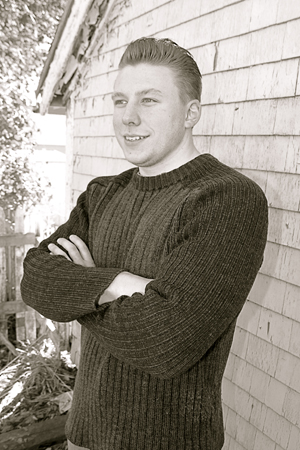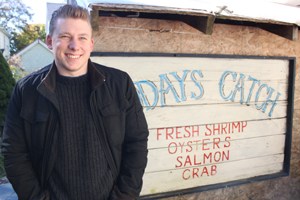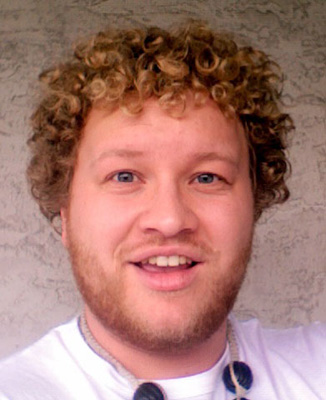A lot of us Leave and Lots of us Come Back: Will Johnson in Conversation with Kris Bertin

Kris Bertin's first major publication was "Girl on the Fire Escape" in The Malahat Review (Winter, 2011 #173). His second Malahat publication, "Your #1 Killer & Extra Hands," appears in our Essential East Coast Writing issue, Fall 2012 #180.
Will Johnson recently graduated from UVic's creative writing program and is now finishing an MFA at UBC. His first major publication was "Sea to Sky," in The Fiddlehead. He now lives in the apartment Kris Bertin formerly occupied in Halifax, NS.
Your story was published in The Malahat Review’s Essential East Coast Writing Issue, which is a joint venture between The Malahat Review and The Fiddlehead, celebrating the differences and similarities between the artists from these regions. How much of a role does geography play in your work?
I’d say it plays a huge role. There’s always a decision about where a story takes place, and even if it isn’t explicitly stated, it’s important to know as a writer. “Your #1 Killer and Extra Hands” never tells the reader that it takes place on PEI, but from its conception I always knew it would. Having this story published in this issue is particularly appropriate—[main character] Chris Rose’s story took him from a small town in the Maritimes to Great Big Toronto, then Montreal, and back to PEI. While he didn’t make it all the way to the west coast, it tells us something about being an East Coaster, which is that a lot of us try very hard to get the hell out of here and find work somewhere else.
It’s also the case that a few of us of small town Maritime people end up getting involved in things beyond our ability to handle, and that’s what happens to Chris in this story. There’s a great National Film Board documentary called The Agony of Jimmy Quinlan about a men’s shelter in Montreal where every single day men struggle to stay sober, and a great majority of these men are from Nova Scotia and Cape Breton, New Brunswick, and other places that didn’t prepare them for living in the greater world. For Chris, it isn’t alcohol that’s brought him back home, but he is severely defeated by something that happened in that same greater world. That this story is about trying to find a meaningful job that isn’t completely soul-killing is not an accident.
“Your #1 Killer & Extra Hands” is definitely a Maritime story, and a familiar one at that. A lot of us leave, and lots of us come back.
This story is included alongside work by established authors like Michael Crummey and Lisa Moore. Are there other East Coast writers you admire? And how relevant do you think it is to identify certain writers as Atlantic Canadian?
My favourite has and always will be David Adams Richards. His stories about the Mirimichi and other New Brunswick locations really speak to me, and illustrate so well what the place is (and was). He can write about real human trauma and despair and put it into a context that does justice to why things are this way. David Adams Richards was one of the first people to make me aware of the greater historical context of where I live, and gave me a bearing that I could follow.
There’s a great moment in For Those Who Hunt The Wounded Down where a social worker expresses her ideas about male violence and hegemony in an over-simplistic and offensive way about the novel’s protagonist. At the time I first read it, Harper had just uttered his culture of defeat slur, and I could see some parallel to it in that particular exchange. Everything is much more complicated than you can know, and it’s so easy for an ignorant outsider to look in and judge us unfairly.

I first read Richards in high school, where I realized it was okay to write about where I come from. Prior to Richards, my short stories were all about secret agents and cowboys and Vietnam vets. Reading him opened everything up for me and I felt completely different things about what I was doing. As far as the importance of identifying writers as Atlantic Canadians, I’m not really sure of it. I don’t particularly think of myself or my work in that way, but I am certainly, undeniably influenced by having grown up in rural New Brunswick. It’s an inextricable part of who I am, and the work I produce.
"Your #1 Killer & Extra Hands" is the third story you've written about Chris Rose. The first one, "Girl on the Fire Escape," was published in The Malahat Review, the second one, "Everywhere Money," was published in Riddle Fence. Now that you've got a full trilogy, do you feel finished with Chris or can we expect more?
There’s another little bit of coincidence. The first one was published in BC, the second part came out all the way over in NFLD, and the third is back with The Malahat’s East-Coast Issue.
In my mind, Chris Rose’s story is done. He’s going to grow into a powerful exterminator and build his business to incorporate the surrounding areas and beyond. Once he’s mostly better, I’m certain he’ll do his best to settle down, and while he may not stay married, he will almost certainly drain the rest of his mother’s life-force with a slew of grandchildren just like him.
This story is about how we get better when we’re hurt. In the story Chris goes from being a boy again, loving his mother completely and eating candy from the corner store, to something like a second adolescence where he rejects her and stays away, all the way up to some semblance of manhood, where he has built up enough layers around himself that he is finally at peace with himself.
In this story, you’ve changed your POV. The first two were told in first-person from Chris' perspective, and now you've chosen to tell the story from his mother's vantage point. Can you discuss why you chose to explore Chris' stories from multiple vantage points? And was it difficult to write from a female perspective?
I think that, first and foremost, the transition from boy to man wouldn’t really have much impact if it weren’t observed by an outsider. Secondly, it just wouldn’t be as interesting if it were told from his point of view. I think he’s going through something even he isn’t completely aware of, and it would do a disservice to the story if I had him in charge. Just like there is a very careful choice to be made about place, there’s an even bigger, more important one about point of view.
It’s always difficult to write from a vantage point that isn’t yours, so writing as a woman is hard, writing as a mother is hard, and writing as a person in their early 50s is hard, too. Writing as Chris was easy, so I wanted to challenged myself and tell the final part of his story from a different place. It’s my job to try and imagine what it’s like to be someone else. Careful observation and lots of rewriting helps, but in the end, it’s about trying to make her seem natural, and trying to make her actions and reactions move the story, instead of the other way around.
You have a knack for visual imagery. I especially liked the icicle that rips through the car roof at the beginning of the story, the bat's wings clapping like hands, and the scene where Chris saws off a branch with a hornet's nest attached to it while wearing a snorkel, goggles, and a snowsuit. Are these the sort of details that you come up with when you're initially writing, or do they come with revision?
I don’t want to sound too silly here, but I just come up with the characters and the conflict and let them run the show. Then I get to watch a movie in my mind, and that’s the story. Of course, I have disposed of hornets in this manner, I’ve heard about icicles shooting through cars like mortars, and I’ve handled some bats in my day, so all of it comes from experience. But as far as why those choices are made, it’s always to illustrate something in the story, about the characters or their motivations, or else it’s some loose, watery metaphor that you get to sort out the meaning of yourself.
Many of Chris' stories involve less-than-ideal employment situations. Do these mirror some of your own experiences, or are they mostly invented?
 I should say that my very first job was mowing lawns at the age of thirteen, and I’ve worked some less-than-ideal landscaping jobs, both of which lend themselves to this story. Also, I was fifteen when my father left my mother, and there were a great variety of pests I had to dispose of myself, including bees, spiders, birds, squirrels, and—one unfortunate year—a whole family of rats that had invaded and took up residence in various parts of the house. My brother was in college, so it was just me and my psychopathic dog who had to deal with them. This was not a paid position, but one I volunteered for in order to preserve my mother’s sanity. I killed every one of those rats, which were—because we lived in a swamp—enormous, horrible things. The act of doing so was cathartic in some way, and definitely mirrors what Chris Rose goes through, albeit in a completely different, much less concise way.
I should say that my very first job was mowing lawns at the age of thirteen, and I’ve worked some less-than-ideal landscaping jobs, both of which lend themselves to this story. Also, I was fifteen when my father left my mother, and there were a great variety of pests I had to dispose of myself, including bees, spiders, birds, squirrels, and—one unfortunate year—a whole family of rats that had invaded and took up residence in various parts of the house. My brother was in college, so it was just me and my psychopathic dog who had to deal with them. This was not a paid position, but one I volunteered for in order to preserve my mother’s sanity. I killed every one of those rats, which were—because we lived in a swamp—enormous, horrible things. The act of doing so was cathartic in some way, and definitely mirrors what Chris Rose goes through, albeit in a completely different, much less concise way.
This year your story "Is Alive and Can Move” (published in PRISM International) was included in the Journey Prize collection. How did it feel to be nominated and what do you think of the end result?
The Journey Prize is something you hope for but don’t expect to get. I’m very proud to have my work published in one of the most-read collections in Canada, and honoured to have even been invited to the party. Around the same time I heard about The Journey Prize, I was also short-listed for the Exile-Vanderbilt Award, and got to be included in their collection too (though I didn’t win, of course). I look at these things as great exposure, and take them as encouraging signs that my collection of short work and my novel can get picked up in the future, and that I can make a career out of this. Now that I know I didn’t win it, the experience has certainly been dulled to me, because the possibility of winning ten grand for my story about an alcoholic janitor was (sorry) intoxicating. But the very best writers in Canada have appeared in the collection, and now I get to say I’m part of that line too. That’s really special.
You've taken some classes with Alexander MacLeod, son of Alistair McLeod. Can you categorize your relationship with him? What do you think of his writing, and what lessons have you taken from his direction?
Alexander MacLeod is a mentor of sorts, the guy I incessantly bother for advice, and someone I respect enormously. As a teacher, he was instrumental in pushing me to be better, and making me really question what I was even trying to do with my work. From what I hear, a great many workshops are very maternal affairs that offer support at the expense of advice, but Macleod’s SMU workshop struck a terrific balance between being nurturing and offering you real, honest, and helpful criticism. He worked tirelessly to offer us the most comprehensive responses to our work, and has given me advice that I still carry with me. MacLeod was hard on me in the best way, and encouraged me to never be lazy and always be critical. I owe him a lot.
That I haven’t read anything better than MacLeod’s Light Lifting since it came outmakes perfect sense. The insights he has as an instructor come from a dedicated work ethic, a carefully honed self-criticism, and real, serious care taken with his own work. If there’s something to be taken from MacLeod’s tremendous success, it’s that it’s okay to wait. A lot of the stories in his collection were written years ago, and he took his time putting them together and making them work. As a young person who is wildly impatient and often frustrated, I often think of MacLeod’s patience as something I need to always remember. It’s far more important to take your time and produce good work than it is to publish something you didn’t take very seriously at the time. MacLeod’s stories are incredible pieces that are going to be around for a long time. That’s something to strive for.

Will Johnson
* * * * * * * *









